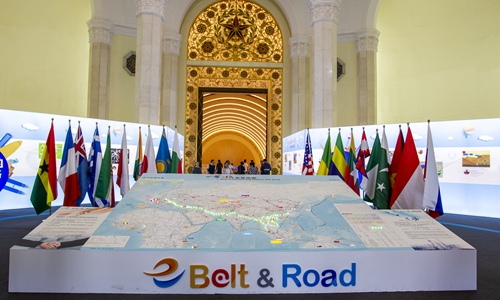BRI synergy vital for economies to endure coronavirus impact
By Liang Haiming Source:Global Times Published: 2020/4/20 21:08:40

The Belt and Road Brand Expo opens in Shanghai in May 31, 2019. Photo: IC
Despite projects interruptions and rising debt loads as the coronavirus pandemic spreads around the globe, there is no doubt that economic symbiosis and mutual support under the Belt and Road Initiative (BRI) are essential so that economies can endure the short-term pain and speed up recovery.
Lockdowns and social distancing restrictions have delayed or even blocked the normal trans-border transport of labor and goods, causing operational difficulties for BRI projects in many participating countries.
Given weaken demand and rising debt ratios in some BRI countries, China's overseas projects need to pay more attention to risk management, and should make appropriate adjustments to initial investment and construction plans to reduce investment and operating risks.
In contrast to short-sighted arguments from certain corners, economic cooperation and mutual support under the BRI are conducive for participating countries to fight the pandemic impact. The initiative will bring new opportunities to boost economic recovery and growth after the pandemic had been effectively controlled.
The BRI is a long-term development plan looking to the future. Its core projects are mostly large-scale infrastructure construction projects with huge investment and long construction periods. Therefore, we must look at the problems brought by the coronavirus pandemic with a long-term perspective, and continue to commit to the high-quality development of the initiative.
The pandemic will eventually pass. In the economic recovery that follows, BRI projects - particularly infrastructure projects - will provide strong support in increasing employment, so as to secure people's livelihoods and promote economic development.
As the world opens its wallet to fight the effects of the pandemic, BRI-participating countries are not seeing major risks to liquidity, and there has been no impact on China's financial stability. The US, European countries and Japan have all approved their own enormous economic stimulus plans. After adopting monetary policies including a reserve requirement ratio cut to secure liquidity in financial institutions, China still has ample policy room and tools to secure its financial stability. What Chinese financial institutions need now is not liquidity but projects to invest in.
China has long carried out stable investment and financing cooperation with BRI countries in a responsible manner, which has supported a number of developing countries in accelerating their industrialization processes and achieving independent and sustainable development. When developing countries face debt difficulties, China negotiates and resolves debt issues through equal consultations.
The BRI will provide a significant opportunity for participating countries to achieve fast economic recoveries after the pandemic. According to China's foreign trade data, ASEAN replaced the EU to emerge as China's largest trading partner in the first quarter. As the pandemic has interrupted the international industrial chain, China has seen a new opportunity to adjust its own industrial chain and expand cooperation with BRI countries. When the global crisis eases, many countries will make greater efforts to promote the construction and development of their production capacities, especially in sectors related to medical equipment, devices and pharmaceuticals. BRI construction and development can proactively dock with these emerging needs to strengthen cooperation and boost growth.
The author is dean of Hainan University Belt and Road Research Institute. bizopinion@globaltimes.com.cn
Posted in: ECONOMY